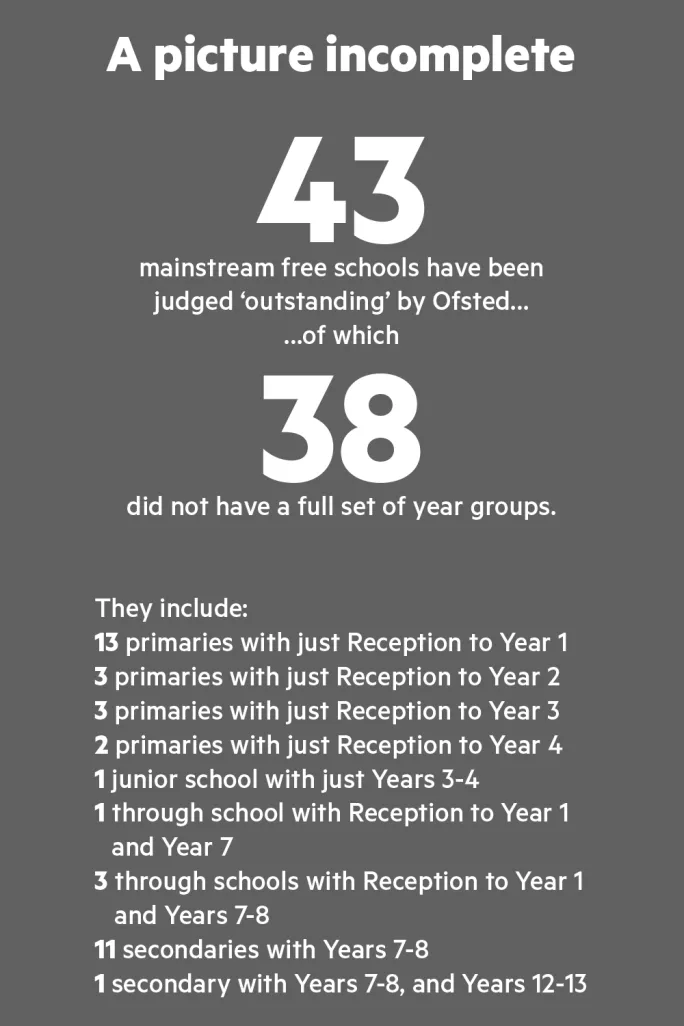Hit the ground running and avoid inspection for ever

Ofsted is often criticised for basing its judgements too heavily on exam and test results. But in some cases, the regulator is making judgements that will stand for many years without any exam results to go on at all, a TES analysis has revealed.
Inspectors have judged 43 new mainstream free schools to be “outstanding”, meaning that they are exempt from future inspection.
However, all but five of these schools were inspected before they had pupils in all year groups - and before they had exam or test results. Critics are concerned about this absence of performance data for schools that could now have “outstanding” judgments in perpetuity.
“People complain that the whole inspection judgement is too data driven,” said Robert Coe, professor of education at Durham University. “But we don’t have any data for new schools. I think that’s a problem.
“We know that schools change. After two-to-three years of existence, the stability of a school is less than schools that are up and running. You’d want to check again, once they’ve been running for longer.”
We don’t have any data for new schools - I think that’s a problem
Under the rules laid out in Ofsted’s school-inspection handbook, schools that are given an “outstanding” rating are exempt from future inspection unless a subsequent risk assessment “raises concerns” about their performance.
Of the 38 “outstanding” schools without results, 25 were inspected with only two year groups for Ofsted to judge performance on. One such school, Abacus Belsize Primary, in North London, opened in 2013 and was inspected in 2015, with only Reception and Year 1 pupils.
In his report, the lead inspector wrote: “From their starting points, pupils make outstanding progress. Standards in reading, writing and mathematics are above agerelated expectations.”
Dixons Trinity Academy in Bradford opened in September 2012 and was inspected in January 2014. At the time, it included only Years 7 and 8; by 2018, it will have about 720 pupils, all the way through to Year 13.
The inspection report stated: “Students make rapid progress from their starting points and after only one year in the academy their attainment is high.”
Concerns over safeguarding
Michael Tidd, TES columnist and deputy headteacher at Edgewood Primary in Nottinghamshire, said: “It strikes me as odd to say that these schools are fine with 60 children, so they’ll be fine for ever.
“How can you judge those schools, when later they might have 450 or 620 pupils? That’s a different establishment, really.”

Mr Tidd said that exempting these schools from further inspections raised important safeguarding concerns. “Once you have that ‘outstanding’ tick, you can have a massive change of staff, a change of management, a change of pupils, and no one ever goes back to check,” he said.
“You’d think a significant change in age range or size or leadership should lead to another inspection - one day, one inspector, just to check if it’s still outstanding.
“Leaving it until something is flagged up is a bit lackadaisical.”
You’d think a significant change in age range or size or leadership should lead to another inspection
Professor Coe suggested that basing inspections on partial information also raised questions about whether Ofsted was treating the users of its reporting information fairly.
He said: “For me, the big question is, what’s the point of this, anyway?
“If your main audience is parents and children, making a choice of school - well, then you need certain kinds of information. And if your main audience is really the secretary of state, to know what’s going on in the system, then you need something different, too.”
Ofsted maintained that it was possible to make a judgement about a school that had only two or three year groups and no exam results.
A spokesperson said: “Examination outcomes are only one of the pieces of evidence used by inspectors. They also consider pupils’ progress through the school’s curriculum, their personal development, behaviour and welfare, the effectiveness of the school’s leadership and management, and the quality of its teaching and learning, before reaching an overall judgement.”
She added that, if concerns arose about the performance of an “outstanding” school, it could be inspected again at any time.
You need a Tes subscription to read this article
Subscribe now to read this article and get other subscriber-only content:
- Unlimited access to all Tes magazine content
- Exclusive subscriber-only stories
- Award-winning email newsletters
Already a subscriber? Log in
You need a subscription to read this article
Subscribe now to read this article and get other subscriber-only content, including:
- Unlimited access to all Tes magazine content
- Exclusive subscriber-only stories
- Award-winning email newsletters